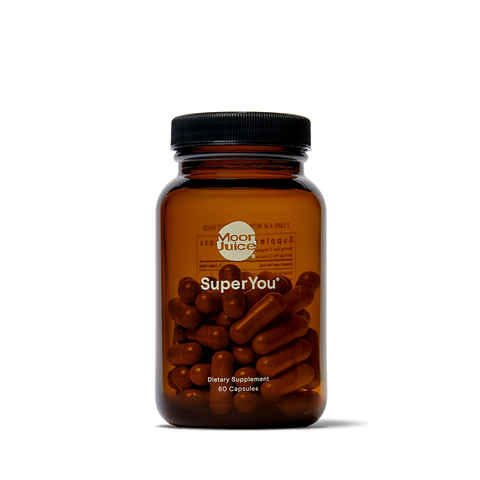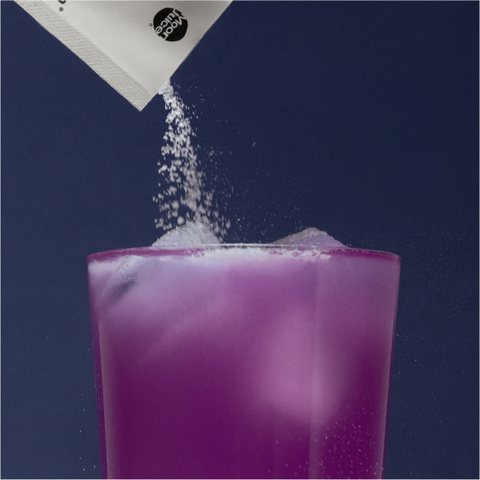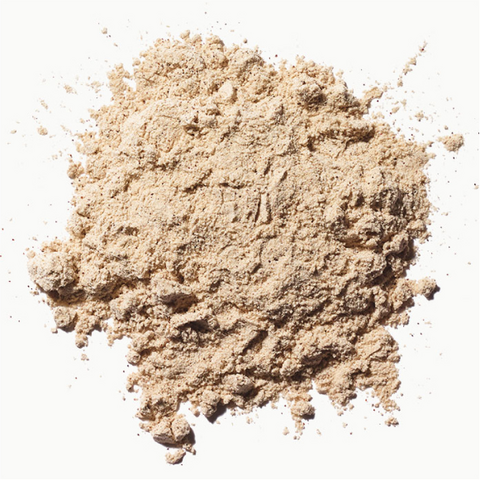Are you finding yourself stressed out more often than not? If so, you’ll want to find ways to reduce cortisol, aka the stress hormone. Contrary to popular belief, cortisol isn’t necessarily “bad.” It helps encourage morning alertness and triggers your fight-or-flight response when you need to be on your toes. That said, if your cortisol levels remain consistently high over time — whether that’s a few days to a few years — everything from poor sleep and fatigue to skin breakouts and digestive distress can kick into high gear.
In case these symptoms sound all too familiar, perhaps it’s time to take supplements to lower cortisol. In fact, there are many natural remedies for stress relief you can try. That is, in addition to practicing your preferred methods of self-care and unwinding. These signs may also warrant a visit to your doctor or holistic healthcare provider, as they can test for high cortisol and help you come up with a treatment plan specific to your needs.
Ahead, we’re diving into 8 of the best supplements to regulate cortisol.
1. Ashwagandha
Native to India, Africa, and certain regions in the Middle East, Ashwagandha is among one of the best adaptogens for stress. Many people use Ashwagandha for stress, but it also offers health benefits for mood, cognition, and sleep.
While Ashwagandha powder has been used in traditional Ayurvedic medicine for centuries, recent clinical research also backs its powers to reduce cortisol and ease symptoms of stress. In a 2019 randomized, double-blind, placebo-controlled study published in the journal Cureus, 58 healthy adults who reported experiencing high levels of stress were given either a 125-milligram or 250-milligram capsule of Ashwagandha root extract or a placebo twice daily for eight weeks. By the end of the study, participants in both Ashwagandha groups experienced:
- A significant reduction in perceived stress scale scores
- A reduction in serum cortisol levels
- Significant improvements in sleep quality
Another randomized, double-blind, placebo-controlled study, published in 2012 in the Indian Journal of Psychological Medicine, involved 64 adults. Participants who took two 300-mg capsules of full-spectrum Ashwagandha root extract daily showed similar positive results.
Within 60 days, participants in the Ashwagandha group experienced:
- A significant reduction in stress-assessment scale scores
- Substantial reductions in serum cortisol levels
The authors of this study concluded that Ashwagandha is a safe and effective means to boost resilience to chronic stress and improve one’s quality of life.
2. L-Theanine
L-theanine, a nootropic amino acid derived from green tea, is another all-star supplement to help you unstress. When comparing Ashwagandha vs. L-theanine, Ashwagandha is known for its long-term benefits in reducing cortisol and enhancing stress resilience, while L-theanine is favored for its quick calming effects, helping to reduce anxiety and promote relaxation without sedation.
In one 2019 randomized, placebo-controlled, crossover, and double-blind trial of 30 healthy adults published in the journal Nutrients, participants who took one 200-milligram tablet of L-theanine daily over four weeks logged:
- Decreased scores on tests for low mood and stress
- Fewer sleep disturbances and less dependence on sleep medication
- Improvements in verbal fluency and executive function scores
This natural supplement may also help lower excess cortisol levels. In a 2016 randomized controlled trial of 34 healthy young adults published in the journal Nutrients, those who drank a beverage with 200 mg of L-theanine experienced:
- A significant reduction in stress response while multitasking an hour post-ingestion
- A reduction in salivary cortisol response to a stressor three hours post-ingestion
While L-theanine can improve outcomes for stress, cognitive issues, and sleep, more consistent research is needed to demonstrate its ability to reduce cortisol.
3. Omega-3 Fatty Acids
Perhaps you’re privy to the fact that Omega-3 Fatty Acids boost brain health and reduce damage caused by oxidative stress (aka the number-one cause of accelerating aging). But did you also know that they’re among the best supplements to reduce cortisol, too?
Per a 2021 randomized controlled trial of sedentary midlife adults published in the journal Molecular Psychiatry, participants who supplemented with 2.5 grams of Omega-3s daily reduced their cortisol levels by up to 33 percent within four months. The authors concluded that Omega-3 supplementation isn’t just an effective way to lower cortisol; it can also boost resilience to stress and slow down accelerated aging on the cellular level.
Tip: While you can opt for Omega-3 supplements to lower excess cortisol, you can also get them by hacking your diet. Cold-water fatty fish (such as salmon, tuna, and sardines) are perhaps best known for their Omega-3 content. Prefer to stay plant-based? Walnuts, chia seeds, and flaxseed oil also pack these potently protective nutrients.
4. Magnesium
Magnesium offers no shortage of benefits that extend to brain health, bowel movements, sleep, and beyond… and most Americans need a lot more of it. In case you still need a gentle nudge to hop on the Magnesium bandwagon, the mineral just so happens to be a top supplement to reduce cortisol levels. In fact, there is a strong link between Magnesium and relaxation.
According to Healthdirect Australia, Magnesium may help regulate your stress response and cortisol levels alike. On the flip side, low Magnesium levels can increase stress and its symptoms (including but not limited to muscle tension and poor sleep). All the while, if your cortisol levels spike frequently, you may be at risk of depleting your existing stores of the mineral.
5. Rhodiola Rosea
Ashwagandha and Rhodiola Rosea are often mentioned alongside each other. After all, they’re both adaptogens, with evidence supporting their ability to minimize stress and its domino effects. One key difference between the supplements is that Ashwagandha shows more robust support to directly lower cortisol, while Rhodiola helps curb certain symptoms of stress (such as mental and physical fatigue) once they arise.
However, one randomized, double-blind, placebo-controlled study published in the journal Planta Medica suggests that Rhodiola supplements also have the ability to reduce cortisol. Amongst 60 regularly fatigued adults, those who supplemented with 576 milligrams of Rhodiola extract daily for 28 days experienced a decreased cortisol response to awakening stress (i.e., the kind that gets you up and at ‘em in the morning). In addition, they logged:
- Significantly reduced scores for burnout
- Better concentration
- Improvements in mental performance
- No major side effects from supplementation
In short, Rhodiola may not only be a trusted ally once stress kicks in but also potentially help reduce high cortisol levels (though more research is needed on the latter front).

6. Vitamin C
Vitamin C is famed for its all-star support for immune function and antioxidant protection. Yet supplementing with what’s perhaps the most famous letter vitamin may also be helpful when it comes to managing cortisol levels. In fact, it’s one of the best vitamins for stress. More research is needed to determine if it’s an effective supplement to reduce cortisol. But at the very least, getting more Vitamin C has the potential to complement other treatments for stress and mood imbalances.
Per a 2020 review in The Journal of Nutritional Biochemistry, Vitamin C deficiencies are widely associated with stress-related diseases. The authors add that Ascorbic Acid, in particular, is highly tolerable and boasts a rapid therapeutic response, so it may be beneficial for those seeking to improve their stress levels, mood, and overall well-being alike. (Simply put, consider it a supporting player rather than a first line of defense against cortisol spikes.)
7. Ginseng
Ginseng offers a range of health benefits due to its antioxidant profile and likely neuromodulating effects, with protection against stress among them. Per a 2017 review in the Journal of Ginseng Research, Ginseng “provides a potential treatment agent for patients with HPA axis disorders associated with hypersecretion of cortisol.”
While further research is needed to understand how the plant is involved in hormone secretion, supplementing with Ginseng supplementation may stand to improve outcomes for those with elevated cortisol levels.
8. Phosphatidylserine
As the Cleveland Clinic explains, Phosphatidylserine is both a natural substance in the body and a nutritional brain health supplement that supports memory, cognitive function, and healthy aging of the brain. Another potential benefit is stress reduction, as supplementing with Phosphatidylserine may help balance cortisol levels in the body.
A 2008 study published in the Journal of the International Society of Sports Nutrition found that Phosphatidylserine supplements "have the potential to attenuate the serum cortisol response to acute exercise stress." The study involved 10 healthy male participants who took either 600 milligrams of Phosphatidylserine or a placebo daily for 10 days. The results showed that the supplement group experienced a more favorable hormonal balance by reducing high cortisol levels, helping to counteract exercise-induced stress and prevent the physiological decline associated with overexertion.
Sources
- PubMedCentral. Adaptogenic and Anxiolytic Effects of Ashwagandha Root Extract in Healthy Adults: A Double-blind, Randomized, Placebo-controlled Clinical Study. https://www.ncbi.nlm.nih.gov/pmc/articles/PMC6979308/
- PubMed. A prospective, randomized double-blind, placebo-controlled study of safety and efficacy of a high-concentration full-spectrum extract of ashwagandha root in reducing stress and anxiety in adults. https://pubmed.ncbi.nlm.nih.gov/23439798/
- PubMed. Effects of L-Theanine Administration on Stress-Related Symptoms and Cognitive Functions in Healthy Adults: A Randomized Controlled Trial. https://pubmed.ncbi.nlm.nih.gov/31623400/
- PubMed. Anti-Stress, Behavioural and Magnetoencephalography Effects of an l-Theanine-Based Nutrient Drink: A Randomised, Double-Blind, Placebo-Controlled, Crossover Trial. https://www.ncbi.nlm.nih.gov/pmc/articles/PMC4728665/
- PubMed Central. Omega-3 Supplementation and Stress Reactivity of Cellular Aging Biomarkers: An Ancillary Substudy of a Randomized, Controlled Trial in Midlife Adults. https://www.ncbi.nlm.nih.gov/pmc/articles/PMC8510994/
- NIH. Omega-3 Fatty Acids. https://ods.od.nih.gov/factsheets/Omega3FattyAcids-Consumer/
- Health Direct. Can magnesium help to reduce anxiety? https://www.healthdirect.gov.au/blog/can-magnesium-help-to-reduce-anxiety
- PubMed. A randomised, double-blind, placebo-controlled, parallel-group study of the standardised extract shr-5 of the roots of Rhodiola rosea in the treatment of subjects with stress-related fatigue. https://pubmed.ncbi.nlm.nih.gov/19016404/
- Science Direct. The role of vitamin C in stress-related disorders. https://www.sciencedirect.com/science/article/pii/S0955286320304915
- NIH. Ginseng. https://www.ncbi.nlm.nih.gov/books/NBK538198/
- Science Direct. Effects of ginseng on stress-related depression, anxiety, and the hypothalamic–pituitary–adrenal axis. https://www.sciencedirect.com/science/article/pii/S122684531630224X
- Cleveland Clinic. Phosphatidylserine. https://my.clevelandclinic.org/health/drugs/25129-phosphatidylserine
- PubMed. The effects of phosphatidylserine on endocrine response to moderate intensity exercise. https://pubmed.ncbi.nlm.nih.gov/18662395/














